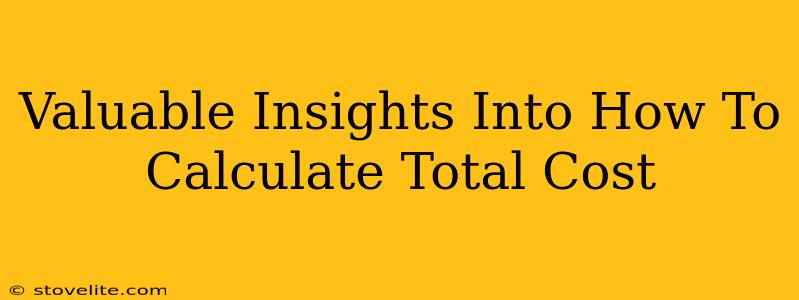Understanding how to calculate total cost is a fundamental skill, whether you're running a business, managing a personal budget, or simply trying to make sense of your finances. This isn't just about crunching numbers; it's about gaining valuable insights into where your money goes and how to make better financial decisions. This guide will break down the process, offering valuable insights along the way.
What is Total Cost?
Total cost, in its simplest form, represents the sum of all costs incurred in producing a certain level of output or completing a specific project. It encompasses both fixed costs and variable costs. Understanding this distinction is crucial for accurate calculation.
Fixed Costs: The Unwavering Expenses
Fixed costs remain constant regardless of production volume. These are your overhead expenses, the costs you'll incur even if you produce nothing. Examples include:
- Rent: Monthly rent for your office space or factory.
- Salaries: Fixed salaries paid to employees (excluding overtime).
- Insurance Premiums: Regular payments for business insurance.
- Loan Payments: Consistent payments on business loans.
- Property Taxes: Annual property taxes on your business location.
Variable Costs: Fluctuations Based on Production
Variable costs change directly with the level of production. The more you produce, the higher these costs will be. Examples include:
- Raw Materials: The cost of materials used in production.
- Direct Labor: Wages paid to workers directly involved in production (including overtime).
- Utilities: Electricity and gas costs, which can fluctuate based on production needs.
- Shipping and Delivery: Costs associated with transporting goods.
The Formula for Calculating Total Cost
The core formula for calculating total cost is straightforward:
Total Cost (TC) = Fixed Costs (FC) + Variable Costs (VC)
Let's illustrate this with an example:
Imagine a bakery. Their fixed costs (rent, salaries, insurance) total $5,000 per month. Their variable costs (flour, sugar, labor for baking specific batches of bread) are $2 per loaf. If they bake 1,000 loaves in a month, their total cost would be:
TC = $5,000 + ($2 * 1,000) = $7,000
Beyond the Basics: Analyzing Total Cost for Better Decision Making
Calculating total cost is just the first step. The real value lies in analyzing the results to make informed decisions.
Break-Even Analysis: Finding Your Profitability Point
By understanding your fixed and variable costs, you can calculate your break-even point. This is the level of production where your total revenue equals your total cost, resulting in neither profit nor loss. This analysis helps you determine the minimum sales volume you need to achieve to stay afloat.
Cost Control and Optimization: Pinpointing Areas for Improvement
Analyzing your total cost breakdown can reveal areas where you can cut costs without sacrificing quality. This might involve negotiating better deals with suppliers, streamlining production processes, or even exploring alternative materials.
Pricing Strategies: Determining Profitable Prices
Total cost is crucial for developing effective pricing strategies. You need to ensure your prices cover your total cost and allow for a reasonable profit margin.
Conclusion: Mastering Total Cost Calculation for Financial Success
Mastering the art of calculating and analyzing total cost is essential for anyone seeking financial success. Whether you are a seasoned entrepreneur or just starting out, this knowledge equips you with the tools to make sound financial decisions, optimize your operations, and ultimately, achieve your goals. Remember, it's not just about numbers; it’s about understanding the story your costs tell and using that narrative to build a more profitable and sustainable future.

